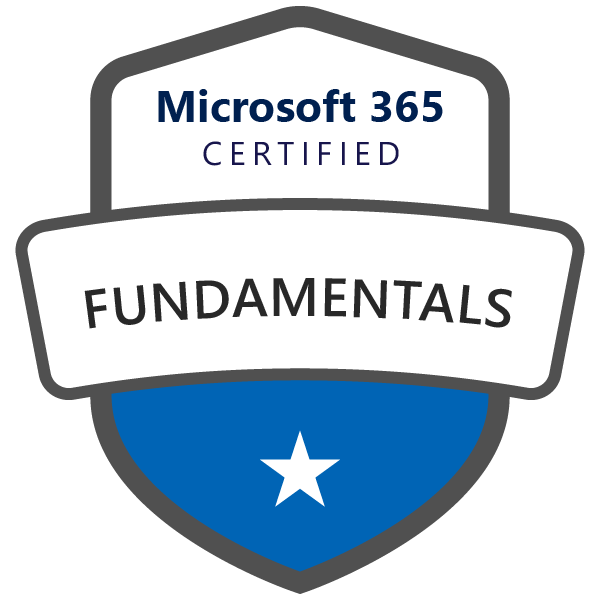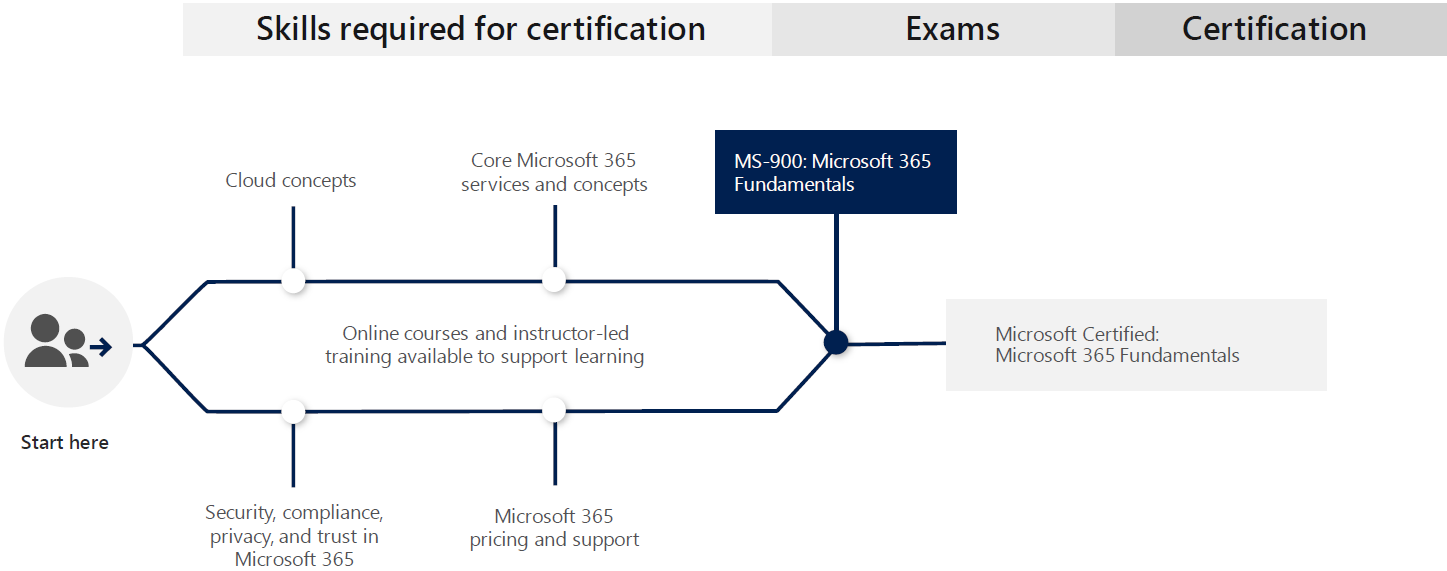Cloud Certifications: Microsoft 365 Certified Fundamentals
Aug 4, 2020 • 11 Minute Read
Introduction
Cloud-based solutions have been high in demand in the last several years, and this is not likely to change in the future. Today, organizations of all shapes and sizes increasingly use cloud-based software and services.
In this guide you will learn about the Microsoft 365 Fundamentals certification and the exam you can take to achieve it.
The Microsoft 365 Fundamentals certification follows Microsoft's departure from broader certifications like the Microsoft Certified Systems Administrator (MCSA) or its older sibling, the Microsoft Certified Systems Engineer (MCSE). Nowadays the focus is on specific roles. Please note that this exam is currently in beta.
Target Audience
This exam is designed for candidates looking to demonstrate foundational-level knowledge on the considerations and benefits of adopting cloud services in general and the Software as a Service (SaaS) cloud model. You should have knowledge of available options and benefits gained by implementing Microsoft 365 cloud service offerings.
You should also have the requisite knowledge to recommend solutions that address common organizational IT challenges and to differentiate Microsoft 365 solutions from the competition in the market, as well as a fundamental knowledge of offerings, optimizing licensing for cost-effectiveness, and support options for organizations. You should be able to differentiate between Microsoft’s services and products (Microsoft 365, Azure, and Dynamics 365).
Applicable Exams
A single exam, the MS-900, is required to gain the Microsoft 365 Fundamentals certification. It is important to understand that Microsoft has taken up the practice of retiring and replacing exams at a much faster pace than in the past. Since the cloud is ever-changing, Microsoft updates live exams frequently.
The price of the exam is US$99/€99. Microsoft offers a student discount if you verify your academic status when booking the exam by using one of the following: a school email account, a school account, an International Student Identity Card, a verification code, or other documentation proving your eligibility for the student discount.
Prerequisites
While there are no specific prerequisites to taking the MS-900 exam, it is worth noting that experience with the required skills is key to a successful experience.
Ensure that you possess sufficient experience and invest the time to go through the relevant Pluralsight courses and other resources.
Skills Measured
Your skills will be measured in the following four categories:
- Describe Cloud Concepts (10-15%)
- Describe Core Microsoft 365 Services and Concepts (30-35%)
- Explain Security, Compliance, Privacy, and Trust in Microsoft 365 (30-35%)
- Describe Microsoft 365 Pricing and Support (20-25%)
These categories are broken down into details as follows:
Describe Cloud Concepts
Describe the different types of cloud services available
- Describe Microsoft’s IaaS and PaaS offerings
- Describe where Microsoft Azure and Dynamics 365 fit into the Microsoft ecosystem
- Cloud-based productivity solutions
Describe the benefits of and considerations for using a cloud service instead of on-premises services
- Describe public, private, and hybrid scenarios
- Identify scenarios when usage of cloud-based services is more beneficial than on-premises services
- Compare costs of cloud-based services with on-premises services
- Identify factors that drive organizations to move to the cloud
Describe Core Microsoft 365 Services and Concepts
Identify core Microsoft 365 capabilities
- Productivity and teamwork (IM and chat, online meetings, email and calendaring, Office productivity apps, file storage and sharing, intranet and team sites, enterprise social, accessibility)
- Business management (simplified management, business process automation, extensibility, business voice and phone systems, forms and workflow management, business intelligence, work management, customer scheduling and booking, mileage tracking and reporting)
- Security and compliance (identity and access management, information protection and governance, threat protection, security management, insider risk management, compliance management, discover and respond)
- Describe the capabilities of the Microsoft 365 Admin center and Microsoft 365 user portal
Describe options for deploying and supporting Windows and Office
- Describe the deployment and release models for Windows-as-a-Service (WaaS) including deployment rings
- Describe the capabilities of Windows Virtual Desktop (WVD) and when it makes sense to implement WVD
- Identify deployment and servicing methods for Office 365 ProPlus
Describe analytics capabilities in Microsoft 365
- Describe capabilities of Workplace Analytics and MyAnalytics
- Describe the reports available in the Microsoft 365 Admin center and other admin centers
Describe Microsoft 365 collaboration solutions
- Explain how collaboration solutions in Microsoft 365 can drive personal and organizational productivity
- Describe the capabilities for extending Office and Microsoft Teams with Power Platform and third-party apps and services
Explain Security, Compliance, Privacy, and Trust in Microsoft 365
Explain zero-trust security principles for Microsoft 365
- Identify key components that need to be protected within an organization’s cloud and on-premises infrastructure
- Describe key security pillars of protection, including identity, documents, network, and devices
Explain unified endpoint management concepts
- Explain device and application management
- Describe bring your own device (BYOD) and application and device management
- Explain the value of the Microsoft Endpoint Manager (MEM) including Microsoft Intune and System Center
Explain identity and access management concepts
- Describe concepts of cloud identity, on-premises identity, and hybrid identity
- Describe the purpose and value of implementing multi-factor authentication (MFA)
- Describe the purpose and value of conditional access
Explain Threat Protection in Microsoft 365
- Identify how Microsoft 365 services address the most common current threats
- Describe the concepts of Cloud App Security
Describe the Service Trust portal, Security center, and Compliance Manager
- Identify differences between the Service Trust portal, Security center, and Compliance Manager
- Explain the trust relationship between Microsoft and service locations
- Describe data protection options including data segregation
- Describe how compliance scores are generated and how they can be used
- Describe scenarios where knowing the compliance score benefits an organization
- Describe the value and capabilities of the Service Trust portal
- Explain insider risk management capabilities in the compliance score
- Identify eDiscovery use cases and scenarios
- Explain why privacy matters to Microsoft
- Demonstrate the Security Center and Secure Score benefits and capabilities
Describe information protection and governance solutions
- Explain information protection and governance
- Identify the types of sensitivity labels and when to use each type
Describe Microsoft 365 Pricing and Support
Plan, predict, and compare pricing
- Describe the Cloud Solution Provider (CSP) pricing model for Windows and Microsoft cloud services
- Explain available billing and bill management options including billing frequency and methods of payment
- Optimize costs based on licensing options
Identify licensing options available in Microsoft 365
- Describe the available licensing and management options for Microsoft 365
- Describe additional capabilities available when a customer purchases Azure Active Directory P1, Azure Active Directory P2, and Azure AD Basic
Describe the service lifecycle in Microsoft 365
- Describe private, public preview, and General Availability (GA) options
- Describe the correlation between lifecycle options and pricing
- Describe use cases and capabilities for the Microsoft 365 Roadmap portal
Describe support offerings for Microsoft 365 services
- Describe how to create a support request for Microsoft 365 services
- Describe service level agreements (SLAs) concepts, use cases for SLAs, SLA tiers, roles, and responsibilities
- Determine service health status by using the Microsoft 365 dashboard or the tenant dashboard
- Describe how organizations can communicate with Microsoft by using UserVoice
Pluralsight Courses
Make sure you check out Pluralsight's Microsoft 365 Fundamentals (MS-900) learning path, which currently contains three courses.
Other Resources
Microsoft Learn provides training resources free of charge. Take a look at the following learning path:
Utilizing Microsoft Docs and navigating to the relevant topics will also enable you to prepare for this exam.
Compensation and Employment Outlook
The cloud business has been booming over the last several years. Microsoft is a leader in this area and keeps growing. While COVID-19 has affected everyone in some way, it certainly doesn't seem to have had a negative impact on Microsoft's cloud growth.
Gaining an up-to-date certification like the Microsoft 365 Fundamentals certification from a household name like Microsoft should make you much more attractive to both your current and future employers, especially since the cloud is booming. Your current employer might not raise your salary, but the next time you go looking for a job make sure you check trusted Internet sources for up-to-date information on salaries in your region.
It's difficult to provide absolute figures because they will depend on numerous factors like your experience, company type and size, industry, and region. Expect salaries for Microsoft 365 professionals—be that an administrator, engineer, consultant, or architect—to range from US$62,000 to US$149,000 in the United States.
Conclusion
As a fundamentals-level certification, the Microsoft 365 Fundamentals credential, while challenging, will earn you recognition as aa subject matter expert in this field. All it takes is a single exam.
Sign up at Microsoft Office 365 for a one-month trial and book the exam, which you can take right in your home or in one of many testing centers.
I hope that this guide is useful and wish you good luck in gaining your certification.
Advance your tech skills today
Access courses on AI, cloud, data, security, and more—all led by industry experts.





